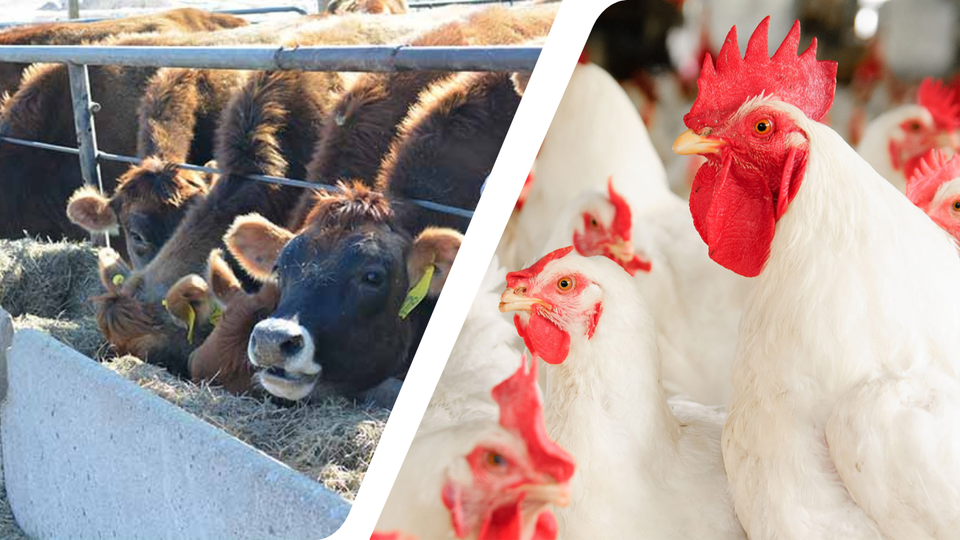Avian Influenza
- For information about Avian Influenza, click here.
- View webinar "Biosecurity for the Small Flock Owner."
What is biosecurity?
Biosecurity is a set of management practices designed to prevent diseases from reaching animals and spreading.
Since diseases can be carried onto a farm on the shoes of visitors, by wildlife or through contaminated litter or feed it's important to identify areas of weakness throughout a farm and production system and have a plan that mitigates each risk.
A good biosecurity plan will consist of measures that create a barrier between potential exposure and animals. The results of a targeted biosecurity plan are healthier animals and a more profitable enterprise.
Why do I need a biosecurity program?
Regardless of the size of your operation, productivity depends on the health of each animal. A biosecurity program is your best defense against production losses caused by disease.
Once a disease begins to spread, it becomes difficult at best, impossible at worst to control. The best strategy is to take steps to prevent disease-causing organisms from reaching your flock. A strong biosecurity program helps you accomplish that.
Quick Answers
What is the Big Red Biosecurity Program?
The Big Red Biosecurity Program provides education about biosecurity specific to poultry. The information will help large- and small-scale poultry producers evaluate the biosecurity risks specific to their operations and establish a biosecurity program to mitigate the risks and protect their flock against the introduction and spread of disease.
The Big Red Biosecurity Program was developed by a poultry veterinarian and professor in the School of Veterinary Medicine and Biomedical Sciences at the University of Nebraska–Lincoln. The program covers all poultry—chickens, turkeys, gamebirds, etc.)—and all sizes of farms (commercial, niche market or backyard production).
Why should I care about biosecurity?
A poultry operation that follows biosecurity best management practices generally has a healthier flock and fewer incidence of disease.
Can any poultry grower participate?
Yes. The Big Red Biosecurity Program was specifically designed to apply to every type of poultry —chickens, turkeys, gamebirds, etc.— and every size of operation (commercial, niche market, backyard).
Can I have my employees participate?
Yes. We encourage everyone who works with or is around poultry to watch the training modules to understand why adhering to a biosecurity program is important. Everyone who understands biosecurity can be part of the strategy to safeguard your poultry.
Is group training available?
Yes. We can provide a full-day workshop for groups of five or more who want to complete the Biosecurity Training Certificate option. The workshop includes the biosecurity training modules and the assessment required to earn the Biosecurity Training Certificate.
The fee for a group workshop varies depending on the size of the group and location. If you're interested in learning more, please email the Big Red Biosecurity Program.
Will the Big Red Biosecurity Program prepare me for an NPIP Biosecurity Audit?
The information provided by Big Red Biosecurity Program covers the 14 biosecurity principles of the National Poultry Improvement Plan (NPIP). After you complete our training modules, you should have a strong understanding of each principle and be well prepared for the NPIP Biosecurity Audit.
Our program is not affiliated with or endorsed by the NPIP. Participating in the Big Red Biosecurity Program does not guarantee passing an NPIP Biosecurity Audit.
How does the Big Red Biosecurity Program work?
The Big Red Biosecurity Program has three components. You choose what fits your needs.
- Training modules available online.
- A biosecurity training certificate program that builds upon the information presented in the training modules and is specific to the type of poultry you raise. This option offers extra preparation for those producers who wish to participate in the NPIP Biosecurity Audit.
- Biosecurity Program Evaluation/Audit to help you evaluate biosecurity strategies specific to your operation.
What is the fee?
There is no cost to view the training modules, which are available 24/7 online.
The Biosecurity Training Certificate has a $25 fee.
Where can I go if I have questions?
We are always happy to answer questions. Please email Dr. Don Reynolds, UNL poultry veterinarian and director of the Big Red Biosecurity Program.
Where can I find information and templates to develop my biosecurity program?
On the Resources page is a section with links to a number of templates and tools to help you develop a biosecurity program or plan for your operation. Since many farms raise more than poultry, we've included links to information specific to a range of situations.
Big Red Biosecurity Features
- Up-to-date biosecurity information provided online 24/7
- Educational modules available online
- Biosecurity Training Certificate program available
- NPIP Biosecurity Audit Preparation program available
- UNL poultry veterinarian available to answer questions about biosecurity. (Questions related to veterinary care should be directed to your veterinarian.)
Contact Us
Please let us know if you have questions or suggestions about the Big Red Biosecurity Program. Usually you'll receive a response within 48 hours. (Please note that responses won't go out on weekends or holidays.)
